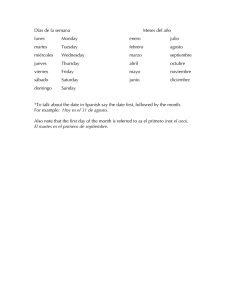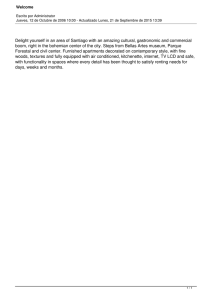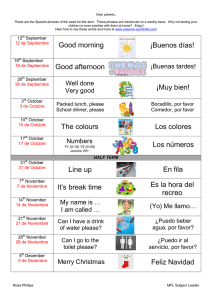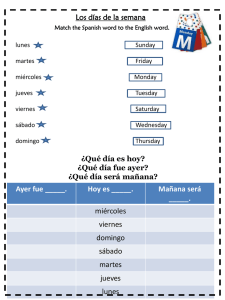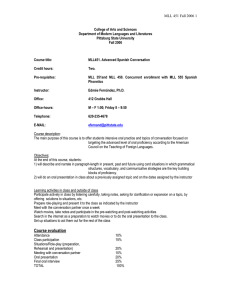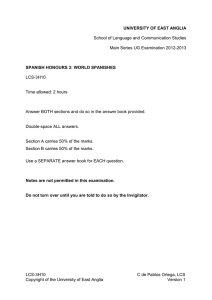Spanish 2214F: Comparative Grammar of English and Spanish
Anuncio
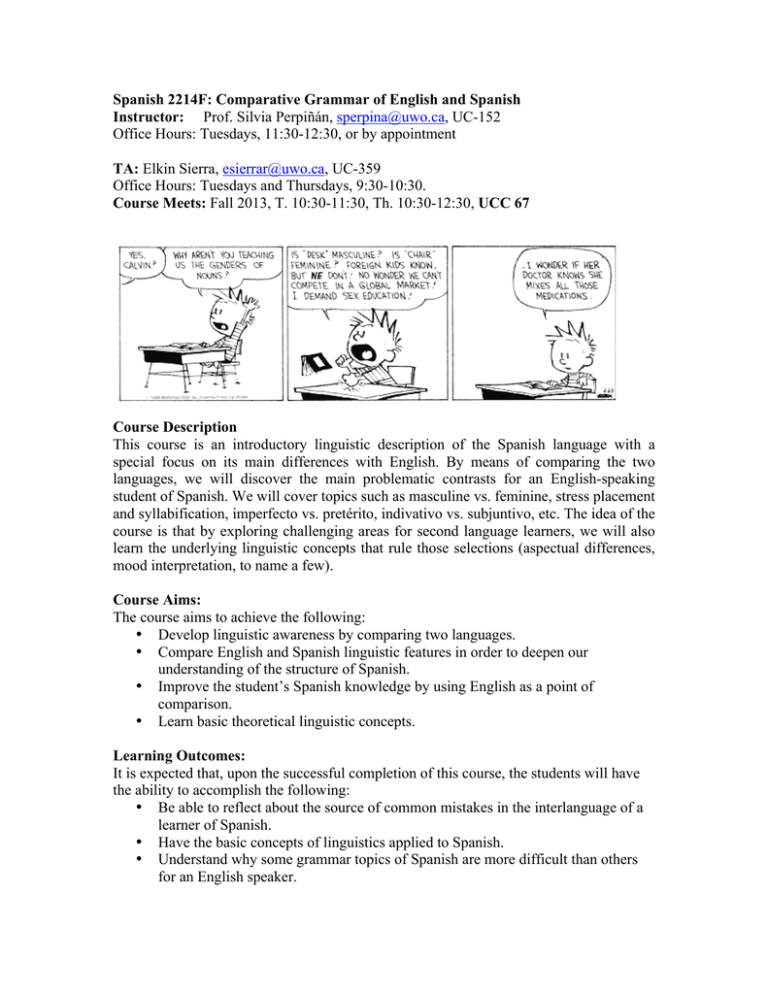
Spanish 2214F: Comparative Grammar of English and Spanish Instructor: Prof. Silvia Perpiñán, [email protected], UC-152 Office Hours: Tuesdays, 11:30-12:30, or by appointment TA: Elkin Sierra, [email protected], UC-359 Office Hours: Tuesdays and Thursdays, 9:30-10:30. Course Meets: Fall 2013, T. 10:30-11:30, Th. 10:30-12:30, UCC 67 Course Description This course is an introductory linguistic description of the Spanish language with a special focus on its main differences with English. By means of comparing the two languages, we will discover the main problematic contrasts for an English-speaking student of Spanish. We will cover topics such as masculine vs. feminine, stress placement and syllabification, imperfecto vs. pretérito, indivativo vs. subjuntivo, etc. The idea of the course is that by exploring challenging areas for second language learners, we will also learn the underlying linguistic concepts that rule those selections (aspectual differences, mood interpretation, to name a few). Course Aims: The course aims to achieve the following: • Develop linguistic awareness by comparing two languages. • Compare English and Spanish linguistic features in order to deepen our understanding of the structure of Spanish. • Improve the student’s Spanish knowledge by using English as a point of comparison. • Learn basic theoretical linguistic concepts. Learning Outcomes: It is expected that, upon the successful completion of this course, the students will have the ability to accomplish the following: • Be able to reflect about the source of common mistakes in the interlanguage of a learner of Spanish. • Have the basic concepts of linguistics applied to Spanish. • Understand why some grammar topics of Spanish are more difficult than others for an English speaker. • Be able to improve their Spanish skills by reflecting on the grammar of the language. Course Materials For this course, there is not a textbook assigned. Course notes and weekly homework will be provided through Sakai. Recommended Books Dozier, E. (2003). Manual de gramática (3rd ed.). Boston: Thompson, Heinle. King, L. D., & Suñer, M. (2004). Gramática española: análisis y práctica (2nd ed.). Boston: McGraw-Hill. Lunn, P. V., & DeCesaris, J. A. (2006). Investigación de gramática (2. ed.). Boston, MA: Thomson Heinle. M. Stanley Whitley (2002). Spanish/ English Contrasts: A Course in Spanish Linguistics. 2nd. Edition. Georgetown University Press. (Also available the e-book) Evaluation Exams: 60% (2 x 17.5, final 25%) Homework: 15% (Tuesdays) Compositions: 15% (3 x 5) Attendance and participation: 10% Exams 1- Nominal Phrase. Thursday, Oct. 10. 2- Morfología verbal. Thursday, Nov. 7. 3- Cumulative + Complex Sentences. TBA Homework At the beginning of each Tuesday, the TA will go around your notebooks and check whether you have completed the homework assigned for that day. You can be given these three grades, depending on your effort: 10 = good job. All exercises are done, homework is completed on time. It is clear that the student spent the necessary time and effort to complete the assignment. Notice that I will not be grading whether the activities are correctly completed, but whether you put the necessary effort into doing it. 5 = minimal effort. There are incomplete exercises, homework is unfinished. Student shows minimal effort into completing the assigned work. 0 = no homework done. Student clearly comes unprepared to class. Student misses class without an excuse. Compositions (Opiniones Personales) During this course, you will compose 3 personal opinions about a recent topic given one week in advance. The main goal of these opiniones personales is to practice the grammar seen in class. There is a minimum length for the essays to get credit, they must be 200 words long and completely in Spanish. List of words, songs, dialogs, and copies of other texts are not acceptable and will not receive credit. Remember that this is individual graded work, so students are not allowed to seek help from other instructors, friends, family members, etc. or use electronic translators. Any composition that has more than three words copied from a text in Spanish (from the internet, from a book, a magazine, etc.) will be given a zero automatically. The compositions need to be handed in on paper in class. No email attachments will be allowed. Other Academic Matters: UWO Academic Calendar (Academic Policies/Regulations). Plagiarism Plagiarism is a major academic offense (see Scholastic Offense Policy in the Western Academic Calendar). Plagiarism is the inclusion of someone else's verbatim or paraphrased text in one's own written work without immediate reference. Verbatim text must be surrounded by quotation marks or indented if it is longer than four lines. A reference must follow right after borrowed material (usually the author's name and page number). Without immediate reference to borrowed material, a list of sources at the end of a written assignment does not protect a writer against a possible charge of plagiarism. This also applies to work facilitated or written for students by third parties. The University of Western Ontario uses a plagiarism- checking site called Turnitin.com. Absenteeism: Students seeking academic accommodation on medical grounds for any missed tests, exams, participation components and/or assignments must apply to the Academic Counselling office of their home Faculty and provide documentation. Academic accommodation cannot be granted by the instructor or department. Calendar (tentative) DÍA TEMARIO Martes 10 de septiembre Presentación del curso. Sílabo. Requisitos Jueves 12 de septiembre Morfología Nominal: Género y número El determinante y su interpretación. La posesión inalienable Martes 17 de septiembre Jueves 19 de septiembre Martes 24 de septiembre Jueves 29 de septiembre Martes 1 de octubre Práctica sobre el sintagma nominal TAREA Leer el sílabo Ejercicios 1 Silabificación y acentuación Reconocimiento del acento silábico. Separación en sílabas El sintagma nominal y sus funciones. Los pronombres Práctica sobre funciones sintácticas y pronominalización Ejercicios 2 Ejercicios 3 Jueves 3 de octubre Martes 8 de octubre Jueves 10 de octubre Martes 15 de octubre Jueves 17 de octubre Martes 22 de octubre Jueves 24 de octubre Martes 29 de octubre Jueves 31 de octubre Martes 5 de noviembre Jueves 7 de noviembre Martes 12 de noviembre Jueves 14 de noviembre Martes 19 de noviembre Jueves 21 de noviembre Martes 26 de noviembre El se. Los pronombres sujeto. Diferencias de uso Repaso Ejercicios 4 Práctica con pronombres sujeto. Dudas Examen 1: El sintagma nominal y la silabificaciónn Morfología Verbal: el tiempo presente, el aspecto progresivo. Entregar Opinión Personal 1 Los infinitivos y gerundios. El aspecto en el pasado. Práctica pretérito imperfecto vs. pretérito indefinido Ejercicios 5 Ser y estar con adjetivos y locativos Práctica ser y estar. Ejercicios 6 (on-line) FALL BREAK Ser y Estar. Por y para. Ejercicios 7 Las oraciones simples y complejas. Repaso. Examen 2: Morfología verbal, Ser y Estar Entregar Opinión Personal 2 (En papel) Tipos de oraciones complejas. El modo subjuntivo Práctica con oraciones subordinadas nominales Ejercicios 8 Oraciones subordinadas adjetivas y el subjuntivo. Interpretación Práctica sobre subordinadas adjetivas. Jueves 28 de noviembre Oraciones subordinadas adverbiales y el subjuntivo Martes 3 de diciembre Práctica subordinadas adverbiales y subjuntivo Jueves 5 de diciembre Repaso. Evaluaciones Ejercicios 9 Ejercicios 10 Entregar Opinión 3 (en papel)
